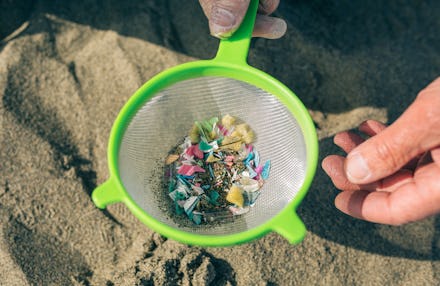Scientists figured out a way to turn single-use plastics into liquid detergents and oils

Plastic is notoriously difficult to dispose of. It doesn't degrade quickly enough when tossed into a landfill, and it usually ends up shattering into tiny microplastics that invade our food sources and air. This has not gone unnoticed by researchers at Northwestern University. Today, these scientists have published the results of their study — uncovering a method that can 'upcycle' single-use plastics into liquid products that can be reused as motor oils, lubricants, or even detergents.
When it comes to getting rid of plastic, recycling is one way to help reduce the amount of waste. But it comes with the caveat of producing greenhouse gases during the process. For the most part, cutting down on our use of plastic is the most effective way to get rid of it. But this is no easy task, the researchers of the study acknowledged.
"There are certainly things we can do as a society to reduce consumption of plastics in some cases," said Aaron D. Sadow, a scientist from Ames Laboratory who co-led the study. "[T]here will always be instances where plastics are difficult to replace, so we really want to see what we can do to find value in the waste."
Essentially, they wanted to turn our plastic trash into treasure. A creative and crafty person might do this by 'upcycling' — a way to reuse waste by turning it into something useful. Turning a jam jar into a knick-knack holder, for example. But scientists are scientists; they want to go beyond that. These researchers wanted to attempt to change plastic waste on a molecular level to turn them into something more useful.
Giving plastic a second life isn't an unusual solution; some places have turned plastic bottles into park benches or chairs. But that process degrades the quality of plastics, noted the researchers, which sometimes results in a lower quality product.
So the scientists decided to use a 'catalytic conversion' method to retain the high-quality strength of the original plastic. This method works on the molecular level — everything is measured in incredibly small nanometers — by using other chemicals (catalysts) to create a reaction that can break the strong chemical bonds of plastic and turn it into a liquid. This liquid can then be used as an ingredient in motor oils, lubricants, waxes, and cosmetics. This method also has an advantage over recycling: there's less waste and fewer greenhouses gases in the process.
The study's other co-lead, Northwestern University's Kenneth R. Poeppelmeier, is excited to present the results of this study as a look at improving sustainability efforts through further research and science.
"Our team is delighted to have discovered this new technology that will help us get ahead of the mounting issue of plastic waste accumulation," he said in a statement. "Our findings have broad implications for developing a future in which we can continue to benefit from plastic materials, but do so in a way that is sustainable and less harmful to the environment and potentially human health."